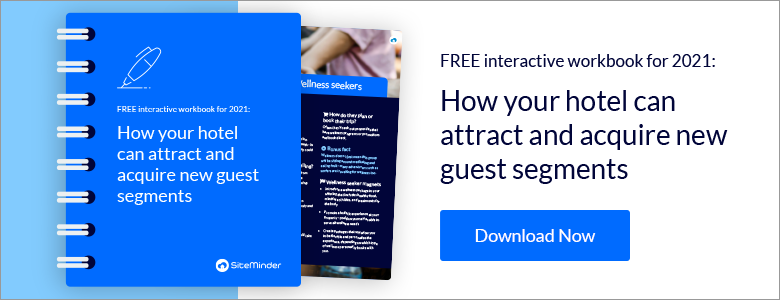Your hotel guests are obviously the most important factor in the success of your business. While, in the long run, they may be represented as numbers on a page or in a bank account; your metrics will never reach the heights you want them to if you look at customers in this way.
It’s crucial to know and understand exactly who is staying at your hotel throughout the year. Every piece of information beyond a guest’s name that you can collect will help inform your knowledge of their motivations, preferences, and purpose. This allows you to segment – group your customers based on common characteristics. It’s vital that you build customer profiles at your hotel if you want to make the most of every booking you receive.
This blog will take you through why it’s so important to develop a robust understanding of hotel guest segments and how you can take advantage of the data you gather.
Table of contents
Why it’s important to focus on hotel customer segments
Segmenting the guests that come to stay at your hotel will help both your business and your customers. On the business front, it lets you identify who the most common groups are that are booking with you and outlines which groups you might want to target more thoroughly. It will also inform your marketing strategies, making it easier to acquire those valuable guests that you’re chasing.
For guests it will mean a more personalised offering and service that responds directly to their preferences before and during their stay. When they feel like they’re being hosted by someone who knows them and will deliver what they need, the motivation to spend is higher. Oh, that’s another benefit to your business.
Here’s a list of the benefits of segmenting and profiling your hotel guests:
- Understanding customer needs means you can implement more attractive packages and up-sell offers
- Understanding customer needs means you can deliver better service
- Delivering better service increases positive reviews and encourages word of mouth marketing
- Knowing your customer enables you make better decisions and adapt quicker when required
- You’ll have more insights into which booking channels to prioritise, improve, or remove
- Forecasting, budgeting, and selling is made much easier
- Hotel performance is boosted with increases in occupancy and revenue expected once you are using strategies based on guest data
How to identify the profiles of hotel guests that stay at your property
There’s a number of questions you need to answer in order to build a knowledge base of your hotel customers and start profiling them in a way that will help your marketing and business decisions. Some of these answers will also help you see your own hotel more clearly.
For example, what is it about your hotel that is making guests choose you over your competitors? Answering this question will let you understand what your guests are looking for in a hotel stay and also what your property’s greatest strengths are.
Maybe your hotel is:
- The best value
- Offers superior amenities
- The most conveniently located
- Great for deals and packages
- Suited for families or groups
- Pet friendly
- Unique or quirky
The more guests you can canvas and find out why they chose you the better. Of course this is just one factor you can take into account when segmenting your customers. You’ll find plenty more further in the blog.
Collecting guest data
- Some data can be gleaned simply from the booking details of your guests – such as their basic information and what extras or upgrades they purchase, and requests they make.
- Some can be gathered from how they behave during their stay – do they order room service? What do they order? Do they use the bar and restaurant? Are they spending more time in the hotel or away from it?
- Other data will need to be asked for – via customer surveys or reviews. Don’t just wait until the guest has checked-out. Check in with them during their stay. According to Airbnb, 70% of guests leave reviews so your questions won’t be wasted.
Seeking and analysing feedback is extremely important.
Factors to consider when targeting guest types that are valuable to your hotel
Guest profiling is an important first step in the journey back to a full hotel and a happy bank account. Without knowing the particular demographics that are likely to be travelling to your destination, you can’t develop effective strategies or offers for them. Your ideal guest may now be different to what it was a year ago, especially with international travellers being less abundant.
Consider these factors and more when compiling data for your guest segmentation:
- Who are they? Where are they from?
- Why are they travelling? Business? Leisure? Medical? Bereavement? A mix? Within that you can segment further. Are the leisure customers tourists who will spend more money or travellers exploring on a budget? Are business travellers choosing the hotel themselves or are they delegates who have their arrangements made for them?
- How long do they stay? What activities do they partake in? Do they seem like they could be repeat customers?
- What do they want out of their stay? What don’t they want?
- How do they plan and book their trips and accommodation?
- Bonus facts/characteristics – what’s unique or defining about them?
Once you have enough information you can build your current guest profiles to identify if there is a dominant group or a combination of a few. You can also decide if there are other valuable segments you think you can and want to attract.
After this you can focus on how best to attract your chosen target segments. What will be a magnet for them?
Don’t forget to download our workbook for more advice!
Hotel guest segments examples
Based on the information you collect you can create personas that represent your current guest segments and even new segments you want to focus on. Give them your own nicknames or use pre-defined groups that match what you’re seeing at your hotel.
Some examples you might commonly see and are featured in our workbook in more detail include:
- Adventurers
- Luxury lovers
- Social influencers/influenced
- Families
- Generation zen
- Socially/Politically conscious
- Wellness travellers
- Digital nomads
- Baby boomers
- Business professionals
- Solo travellers
Even within some of these broad segments there are subsections you can drill down on. For instance, instead of solo travellers – female solo travellers. Getting more specific lets you target even better and deliver even better service.
Technology to help you win bookings and revenue from your chosen type of traveller
There are two vital pieces of technology every hotel needs on their backend: A channel manager and online booking engine. Together these tools will help you attract more of the guests you want, increase revenue and profit, and manage your business easier.
Channel manager
Because a channel manager automates and accelerates so much of your work via a pooled inventory model and PMS integration, you can connect to more and more online travel agents without increasing your workload.
This puts your hotel in front of millions more travellers than you could have reached without these connections. This means you can easily promote your rooms on all the channels your target segments are likely to book on and have a better chance of winning reservations from the travellers you really want staying at your property.
Don’t know what a channel manager is or how it works? Read our dedicated blog here.
Online booking engine
Your booking engine is the equivalent of a shopping cart for your hotel. Guests can decide what rooms, packages, and deals they want and checkout directly on your website or even your social media pages using a booking engine.
You’ll want to use your booking engine to create attractive offers that are tailored to your chosen guest segments. The best thing is that your bookings will be commission-free!
Don’t know what an online booking engine is or how it works? Read our dedicated blog here.
Hotel guest segments: Key takeaways
- It’s crucial to know and understand exactly who is staying at your hotel throughout the year.
- It will inform your marketing strategies, making it easier to acquire those valuable guests that you’re chasing.
- When guests feel like they’re being hosted by someone who knows them and will deliver what they need, the motivation to spend is higher.
- There’s a number of questions you need to answer in order to build a knowledge base of your hotel customers.
- Some data can be gleaned from booking details while other information needs to be acquired.
- Even within broad segments there are subsections you can drill down on.
- There are two vital pieces of technology every hotel needs on their backend: A channel manager and online booking engine.




